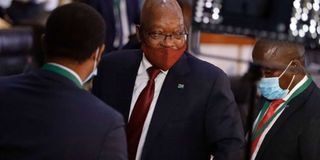Jacob Zuma faces criminal charges for State Capture Commission walkout

Former South African President Jacob Zuma (center) leaves the Commission of Inquiry into State Capture in Johannesburg during a break on November 16, 2020.
What you need to know:
- Deputy Chief Justice Zondo moves to restore order in hearing after ex-head of state absconded proceedings
- Legal experts say DCJ has “bent over backwards” to avoid any grounds for allegations of negative bias
- Zondo in race against time as his two-year-old body draws to its end, with the final report due in March
Former South African President Jacob Zuma is to face criminal charges for walking out of the Commission of Inquiry into State Capture without permission last week.
Deputy Chief Justice Raymond Zondo declared at the start of proceedings of his commission on Monday that the former head of state would be investigated.
“Most of the evidence is available as it was broadcast live on TV,” said Zondo, adding that the commission secretariat would lay the charges with police.
Zuma faces a fine, which was UK£50 in 1947, likely to be updated by any adjudicating court to around US$650, and jail time of up to six months. Zondo will also summon Zuma.
In an extraordinary move, seen as a bid to forestall Zuma’s ongoing ‘Stalingrad’ legal tactic of playing out every and all possible appeals and options in order to delay appearing in the witness box, Zondo is approaching the Constitutional Court to have its non-appealable support for the former president’s required attendance at the commission on dates set.
Counterpointing Zondo’s moves are Zuma’s efforts to have the DCJ non-recusal overturned and to lay related complaints before the judicial oversight authority for alleged ‘misconduct’.
Legal experts say Zondo has “bent over backwards” with respect to Zuma, precisely to avoid any grounds for allegations of negative bias.
Zuma’s efforts to have both Zondo’s non-recusal ruling overturned and somehow to avoid testifying at the commission, are doomed to fail, in the view of almost all legal analysts. They point out that Zondo could have simply issued an arrest warrant for Zuma.
As DCJ, and obviously intimately acquainted with the facts of the matter, Zondo could have issued a bench warrant, but preferred handing the issue over to the police and prosecuting authorities so that he can further demonstrate his non-bias.
Zuma’s legal team began proceedings with an attack on the heart of the commission in making arguments for Zondo to recuse himself.
Taking an extra day to consider that application – made on the basis of Zondo’s alleged prior personal relations with Zuma, described by the former president as a ‘friendship’, which the DCJ denied.
Wide-scale corruption
Prior testimony at the commission – from 35 out of over 250 witnesses – has severely implicated Zuma in both directly or indirectly facilitating wide-scale corruption and dubious financial dealings amounting to losses from the public purse of over US$65 billion.
Zuma first appeared before the commission last year during which he spun out a highly improbable tale going back to the early 1990s involving various foreign spying agencies in a “plot” to bring him down.
When he had finished his initial testimony, in which numerous apparently fact-free allegations were made, including against supposed current and former ‘comrades in the struggle’, the commission investigators began to question Zuma in greater detail. He objected, saying he felt that he was being “cross-examined”.
After lengthy negotiations, it was arranged that Zuma be provided prior incriminating testimony so that he could “properly prepare” to face questions.
But thereafter Zuma proved extremely difficult to get back into the witness box, crying off twice for ill health at the last minute, and being ‘unavailable’ for other possible appearance dates.
Last week, even before Zondo ruled against Zuma’s bid to have the Justice recuse himself, his lawyers had already said that if Zondo so ruled their client would refuse to answer any questions.
Now Zondo is in a race against time as his more than two-year-old commission draws to its end, with his final report due in March next year.
He must, to properly fulfil the commission’s mandate, get Zuma into the witness box again to face questions – even if he refuses to answer any, under SA’s constitutional right to not incriminate oneself.
The direct approach to the Constitutional Court for its support of the new summons of Zuma, which is being issued, is a strategic move by Zondo to head off any further refusals by the former president to take the witness box through legal loopholes.





